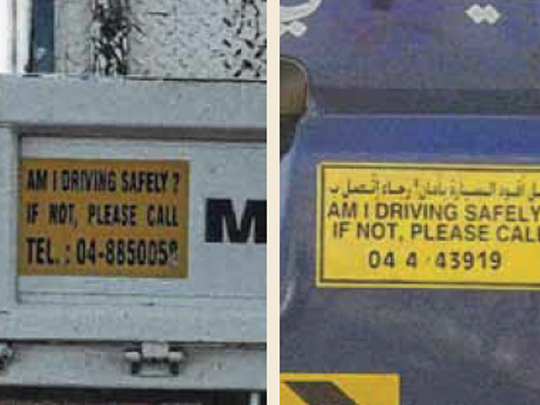
Dubai: Commercial vehicles may have to display a unified hotline number for complaints on driving behaviour, a senior official said.
Currently, most private company vans or pick-up trucks voluntarily carry stickers that read: “Am I driving safely? If not, please call [the company number]”.
Similar stickers appear on some government vehicles too, displaying the department’s contact number.
Other mini buses or trucks have put up an email address instead.
A unified official hotline is one of the ideas being considered by the Federal Traffic Council (FTC), said Maj Gen Mohammad Saif Al Zafein, Assistant to the Dubai Police Chief for Operations’ Affairs and Chairman of FTC.
The FTC chairman said there have been talks with the Roads and Transport Authority (RTA) on the idea. He added that the complaints number could either be a police or RTA hotline, pointing out that nothing concrete has been decided yet. Maj Gen Al Zafein said there is currently no law requiring such stickers on vehicles.
The whole idea behind the move is to make roads safer for everyone.
An RTA official also told Gulf News the practice is voluntary at the moment.
“[The stickers] are not mandatory… However, I don’t think it does any harm to have the stickers on these vehicles so the driver behaves well,” said Ahmad Behroozian, CEO of RTA’s Licensing Agency.
Switched off
The privately-listed numbers serve as a means to alert the company of the driver about his or her driving behaviour.
However, a random check by Gulf News recently showed a few of the mobile phone or landline numbers were scratched out or missing digits.
Others were turned off or unreachable.
A number of calls did go through – one supervisor said the stickers promote responsible driving.
“Sometimes we get a call that our driver is blocking someone’s villa gate, or the driver is not letting others pass [overtake] on the road. It helps us resolve the problem,” he said.
“We have a satellite system that tracks our vehicles, so we know if the driver was really where the complainant claims he was. We also see what the driver has to say about the incident.”
The supervisor added that warning letters are issued to the driver “against genuine complaints”.
Another employee at another firm said “if there are a lot of complaints regarding the same driver, we take action,” but declined to provide details.
It is not known how common the practice of calling the listed numbers is, or what action is taken by firms against complaints.
A supervisor of drivers, whose mobile number was on a blue tanker truck, said he has never received a complaint call in the two decades he has worked for the company.
A motorist said it was “not safe or practical” to take down the details on some of the stickers.
“Am I expected to jot down the email address and send a mail from my mobile while driving if I have a complaint to make?” said Mohammad Omar, a British motorist in Dubai.
Other stickers are in tatters, or too dirty to be legible.
Each sticker costs about Dh10 and is available at “car sticker shops” in Al Satwa or Ras Al Khor industrial area, a drivers’ supervisor said.
With inputs from Shafaat Shahbandari, Staff Reporter











